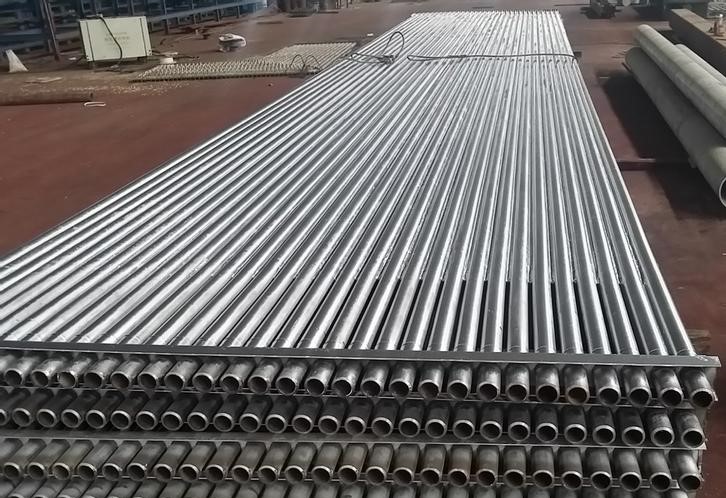Introduce Water Wall Tube
Water Wall Tube: A Component in Industrial Boilers and Power Plants
A water wall tube, also referred to as a water-cooled wall tube, is a vital component in the operation of industrial boilers and power plants. Designed to absorb heat generated during the combustion of fuel in the furnace, these tubes transfer heat to the circulating water inside. This heat exchange process is crucial for generating steam, which is then used to produce electricity or for heating in various industrial applications.
Features and Functions of a Water Wall Tube:
⇒Heat Absorption: A water wall tube is typically constructed from high-quality steel or alloys, which are capable of withstanding extreme temperatures and high-pressure conditions. These tubes are strategically placed in the furnace area, directly exposed to the heat generated by burning fuel.
⇒Cooling Effect: Inside the water wall tube, water or a mixture of water and steam circulates. As the water wall tube is exposed to the hot flue gases on the outside, the water absorbs heat, preventing the tube from overheating and ensuring the systems stability.
⇒Steam Generation: The heat absorbed by the water inside the water wall tube turns the water into steam. This steam is then collected and used for generating power, such as driving turbines in power plants, or for various industrial processes requiring heat.
⇒Tube Arrangement: To maximize heat transfer efficiency, water wall tubes are typically arranged in a serpentine or staggered pattern. This design increases the surface area of the tubes exposed to the hot gases, ensuring effective heat exchange and enhancing overall system performance.
⇒Temperature Control: Maintaining the proper temperature within the water wall tube is essential for the safe and efficient operation of the boiler or power plant. Advanced control systems regulate water flow, ensuring that the tubes are adequately cooled and avoid thermal stress.
⇒Boiler Efficiency: Water wall tubes are integral to the overall efficiency of boilers and power plants. By efficiently transferring heat from the combustion chamber to the circulating water, they help optimize energy conversion and minimize fuel consumption.
⇒Water wall tubes are indispensable in modern boiler and power plant technology, playing a critical role in the conversion of thermal energy into electricity or process heat while protecting the structural integrity of the equipment. Regular maintenance and monitoring of water wall tubes are essential to ensure their safe and reliable operation.
Functional Benefits of Water Wall Tubes
Beyond their use in energy production, water wall tubes offer several functional benefits, especially in indoor and residential environments:
⇒Noise Reduction: Water wall tubes can serve as natural sound barriers. The soothing sound of flowing water can mask unwanted background noise, creating a more peaceful environment. This is particularly useful in urban areas where traffic and other disturbances are common.
⇒Air Quality Improvement: Water wall tubes contribute to improved air quality by releasing negative ions into the surrounding air. These ions help reduce airborne pollutants such as dust, allergens, and smoke, making the air cleaner and healthier to breathe.
⇒Humidity Regulation: The continuous flow of water within water wall tubes adds moisture to the air, which is particularly beneficial in dry climates or during winter months when indoor heating can dry out the air. Maintaining proper humidity levels is important for both comfort and health.
⇒Relaxation and Well-Being: The calming sound produced by water wall tubes promotes relaxation and reduces stress. Incorporating water walls into spaces such as wellness centers, spas, or even corporate offices can help create a tranquil environment conducive to mental well-being.
⇒Enhanced Privacy: Water wall tubes can also enhance privacy by creating both visual and auditory barriers. The flowing water helps obscure views and muffles sounds, making it an effective tool for creating private areas in both indoor and outdoor settings.
Types of Water Wall Tubes
Water wall tubes can be categorized based on their structure and placement within the furnace.
By Structure:
⇒Bare Tube Water Wall: Made up of a simple row of parallel, seamless tubes, this is the most basic design.
⇒Studded Tube Water Wall: These tubes feature studs welded to the surface and are covered with refractory materials. Studded Tube Water Wall are commonly used in high-combustion zones, such as near coal burners, to enhance combustion stability.
⇒Ribbed Tube Water Wall: Designed for use in once-through boilers, subcritical or supercritical boilers, and areas with high thermal load, ribbed tubes promote turbulence in the water flow to prevent film boiling and improve heat transfer efficiency.
⇒Membrane Water Wall: This panel consists of a series of tubes welded together with flat steel bars. Membrane walls are often used in medium and high-pressure boilers and offer superior protection for the furnace walls.
By Location:
⇒Single-Side Heated Panel: Located within the furnace wall, this design heats the tubes from one side.
⇒Double-Side Heated Panel: Positioned in the middle of the combustion chamber, this design exposes the tubes to heat from both sides.
Advantages of Membrane Water Wall Panels
Gas-Tight Enclosure: Reduces air leakage into the furnace, improving combustion efficiency.
⇒Enhanced Heat Transfer: Membrane panels provide a large heat transfer surface, offering the best protection for the furnace wall without requiring additional refractory layers.
⇒Reduced Heat Storage: Membrane panels minimize heat storage in the furnace wall, allowing for faster start-up and shutdown times.
⇒Simplified Structure: The top-supported design reduces the amount of metal needed and simplifies installation.
⇒Less Slag Formation: The membrane design helps reduce slag buildup on the furnace wall.
⇒Prefabricated Units: Membrane panels are prefabricated in the factory, making them easier to install on-site.
Water wall tubes are vital for the efficient operation of boilers and power plants. By improving energy efficiency and contributing to functional benefits like noise reduction, air purification, and humidity regulation, they support both energy production and environmental comfort.


